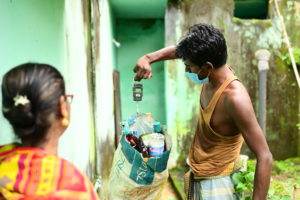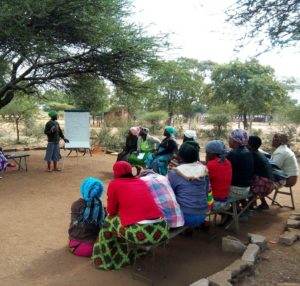What are the ‘6 Rs’ of sustainability?
The ‘6 Rs’ are Reduce, Reuse, Recycle, Refuse, Rethink and Repair. These are all terms related to ways we can lead a more sustainable life and lessen our impact on the environment:
- Reduce – Reduce refers to cutting down the amount of materials we consume.
- Reuse – Before buying new items to replace the old, ask yourself if they can be reused or repurposed before you discard them.
- Recycle – If we must discard of something, it can usually be recycled, and the materials can be reused to make something else.
- Refuse – ‘Refuse’ means refraining from buying and using things that you don’t need.
- Rethink – Before you buy another product, rethink – do I really need it?
- Repair – It’s easy to replace items when they break or wear away, but before we do, we need to consider if they can be repaired.

Plastic waste in rivers is a huge problem around the world. It pollutes waterways, causing illness and limiting livelihoods. Our new partnership with Lamor Foundation is cleaning up rivers in Bangladesh with new waste collection units. They’re creating jobs with better working conditions and fairer pay for informal waste collectors. And the waste plastic will be recycled into ultra clean fuel.
The 6 Rs focus on sustainable products, and our relationship with them. They remind us of an overall ethos to be more environmentally friendly, as well as straightforward practical measures to consider before we buy things or discard them. They encourage us to live a life of zero waste.
An introduction to the 6 Rs
Here are the 6 R’s explained in a bit more depth:
1. Reduce
Reduce refers to cutting down the amount of materials we consume. If we consume less, we’ll waste less. Although its impossible to go without the essentials, we can do our bit to help the environment by using only what we need.
Personally, we can cut down on the amount of clothes we buy to combat against fast fashion, as well as decreasing meat and dairy products in our diets.
An example of reducing waste is the cost levied on plastic bag usage in supermarkets. Before this was introduced, the average person used around 140 single-use plastic bags a year. This has been reduced to an estimated 4 annually, with a 95% cut in plastic bag sales.
2. Reuse
Before buying new items to replace the old, ask yourself if they can be reused or repurposed before you discard them. For example, you could use old plastic food containers for another storage purpose, plastic bottles as plant pots, or bring along your own reusable cup when you’re popping out for a coffee.

In Kenya, women are leading the way improving the health of people and the planet. Traditionally, trees have been cut down to provide fuel for cooking. Not only does this lead to deforestation, the smoke is bad for health. With our support, female entrepreneurs are creating low-smoke fuel by reusing waste products – it’s a win-win for people and the environment.
3. Recycle
If we must discard of something, it can usually be recycled, and the materials can be reused to make something else. Make sure you’re separating your glass, plastic and cardboard materials and disposing of them in the appropriate bins.
4. Rethink
Before you buy another product, rethink – do I really need it? By consuming more products, we’re creating more, and discarding more. This ends up in landfills, where masses of rubbish are burned away, contributing to the greenhouse gasses that are damaging our climate.
Consider if the products you’re buying are designed in a way that considers people and the environment – were they made ethically? Are they made of recycled materials – can they be recycled?
If we don’t understand our consumption habits and their impact on the environment, we’re less likely to rethink our buying habits. By making an effort to find out more about the impact of things we buy on the environment, we’re able to put ourselves in a better position to make smarter, everyday choices.
5. Refuse
‘Refuse’ means refraining from buying and using things that you don’t need. Try to reuse what you can and limit your usage of single use items like plastic straws and carrier bags. The most environmentally friendly resources are those we don’t use at all.
6. Repair
It’s easy to replace items when they break or wear away, but before we do, we need to consider if they can be repaired. A hole in your clothes can be easily sewed, and broken items can be glued or taped. Faulty phones and tablets can be taken to repair shops, and shoes can be re-soled. Not only will repairing items save you money, it’ll help the environment by reducing your usage of materials.
What can I do?
If everyone in the world used as many resources as we do in the UK, we’d need three planets the size of earth to sustain us.
We can all do our bit to reduce the amount of waste we produce, recycle more and replenish natural resources. Here are some ideas…
Reduce the amount of litter in your community
Would you like to do your bit to tidy up your local community? #LitterHeroes is Keep Britain Tidy’s way of supporting everyone who wants to do their bit to create a better environment on their doorstep and anyone who is already making a difference.
Visit Keep Britain Tidy and join the “Litter Heroes”.
Rethink the way you use your garden
Zero waste gardening is becoming increasingly popular. Growing your own food, even if you have a small plot, can be extremely satisfying. Recycling waste products within your garden can make you feel even more self-sufficient. Why not start your own circular gardening project?
Read Zero Waste Week’s top circular gardening techniques.

In Nepal, some people in poorer areas make a living from sorting through rubbish dumps collecting waste with value that they can sell on, including to companies that recycle plastic. It’s a dangerous job and a difficult way to make enough money to support a family. We work with waste collectors to make their job less dangerous and more profitable.
Reduce your plastic footprint
We can all play our part when it comes to reducing the amount of plastic in the world’s waterways. Avoiding single-use plastics, reusing plastic water bottles and choosing recyclable plastic products wherever possible are just three tactics for doing your bit.
Find out more ways to reduce your plastic footprint here.
Refuse energy that isn’t green
The simplest and most impactful thing we can all do to reduce our carbon footprint is to review our energy use and switch to the greenest solutions. Ecotricity are offering to donate up to £60 to our work if you switch your electricity and/or gas to them.
Ecotricity generates all their electricity from wind and sun parks around Britain. It’s also certified vegan. Their gas is a mix of carbon-neutralised natural gas and sustainable green gas. Instead of paying dividends they invest your bills in building new forms of green energy.
Find out more and switch to Ecotricity.
Reuse your food waste with composting
How you dispose of your food waste has an impact on the environment. But you don’t need to turn your kitchen waste into food to make good use of it. Composting is an easy way to reduce food waste that would go to landfill and it’s very easy to get started.
Read the BBC Good Food guide to composting food waste at home.
Other Rs
Many other ‘R’ words fit within the wider context of sustainability and some are interchangeable with the main 6. Others could include Repurpose, Refill , Regift, Repeat and Refresh.
We need to ‘Re-ad’ as widely as possible, to educate ourselves even more on the subject of sustainability and climate change and always to Redouble and Reinvigorate our efforts to change our ways of life and to make a difference.
The 3 pillars
A more sustainable world is one of the main purposes of the 6 R’s. There are 3 ‘pillars’ of sustainability, which add a bit more context to their use. These are social, environmental, and economic, sometimes informally described as people, planet and profit.
People
The people or social pillar focuses on a good quality of life for all, stimulating equality and diversity. It strives to balance the needs of the individual with the needs of a group. Many factors of wellbeing fall under the umbrella of social sustainability, such as reducing poverty, creating safe and diverse workspaces, and making healthcare and education more accessible for all.
Planet
This pillar encourages environmental sustainability. It encourages processes that help reduce carbon footprints and the environmental damage done by an organisation, with goals to become net-zero and carbon neutral.
Profit
The profit pillar realises that supporting economic growth is important, but also that the people and planet pillars can’t be compromised. A business must be profitable, but to be sustainable, it must be responsible in the products it uses and creates.
This means using materials that produce as little waste as possible, whether that’s recyclable products or zero waste packaging. This pillar cannot work without support of the other two.
Together, we can make a difference
We’re working with people across the globe to implement ingenious ways to reuse or recycle waste. We can all do our bit, by supporting the waste heroes and by making small changes in our own lives that add up to a big difference.
Together, we can keep our communities healthy, reduce the amount of waste we produce and protect natural resources.
